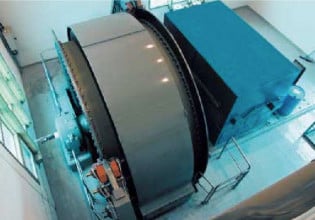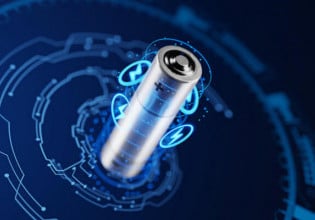Li-Bridge to Double US Li-ion Battery Revenues by 2030
According to a recent report citing economic security interests, the Li-Bridge initiative intends to achieve 100% self-supply for domestic U.S. lithium battery manufacturing by 2050.
Li-Bridge, a public-private alliance assembled by the U.S. Department of Energy (DOE), and managed by Argonne National Laboratories, has a new action plan for accelerating U.S.-based lithium battery production, addressing battery manufacturing and the supply chain needed to support production.

Li-Bridge public-private initiative to support U.S. battery production. Image used courtesy of Li-Bridge
The report “Building a Robust and Resilient U.S. Lithium Battery Supply Chain” outlines 26 specific actions to enhance U.S. lithium battery production. Recommendations include the establishment of a buying consortium for raw materials, joint pilot lines to accelerate the commercialization of new battery technologies, investment for battery manufacturing workforce training, and streamlined permitting requirements.
The Li-Bridge initiative aims to reach $33 billion in annual revenues and 100,000 new jobs associated with battery production in the U.S. by 2030 and near 100% supply chain independence by 2050.
The Li-Bridge Initiative
Formed in October 2021 by the DOE, the stated purpose of Li‑Bridge is to develop a strategy for establishing a robust and sustainable supply chain for lithium battery technology in North America.
Li-Bridge is a public-private consortium guided by three private industry trade groups: NAATBatt International, New York Battery and Energy Storage Technology (NY-BEST) Consortium, and New Energy Nexus. DOE National Labs and Boston Consulting Group will also play active roles in the group.
According to the report, lithium battery technologies are essential to economic growth in the 21st century and of equal stature to semiconductors. These technologies are critical to the U.S. meeting its goal for zero emissions by 2050 and are an increasingly important component of new defense and security platforms.
About 76% of lithium battery cells, and their associated sub-components, are produced in China. U.S. economic security is at risk without a stable and secure domestic supply chain and production capability.
The report is the result of inputs from more than 40 private companies, composed of both established industry leaders and start-ups from the automotive, advanced battery, mining and chemical, and electric utility sectors. These companies employ 1.2 million people and generate nearly $1 trillion in annual revenues.

The U.S. relies heavily on imports for its lithium battery upstream supply. Image used courtesy of Li-Bridge
Strengthening U.S. Battery Production
The objectives in the Li-Bridge report align with larger U.S. policy initiatives targeting more robust domestic battery and semiconductor manufacturing as supported by recent Federal spending legislation that includes the Inflation Reduction Act (IRA), Bipartisan Infrastructure Law (BIL) and the CHIPS and Science Act.
The report articulates the scale of the challenge by asserting that global demand for lithium batteries is projected to increase by more than a factor of 5 by 2030, with demand rising by more than six times over the same period. Without direct action, the U.S. remains highly dependent on imports to meet domestic demand for lithium batteries, particularly in upstream portions of the supply chain encompassing raw and processed materials.
The report admits the U.S. is unlikely to achieve complete supply chain independence for lithium battery production by 2030. Still, it is estimated that up to 60% of the economic value can be captured by then, translating to the stated target of $33 billion in annual revenues and 100,000 new jobs associated with battery production in the US. Beyond 2030, the report calls for nearly 100% supply chain independence by 2050.

The U.S. is projected to double the self-supply of batteries by 2030. Image used courtesy of Li-Bridge
Batteries Are Important to Economic and Emissions Goals
According to program representatives, there are multiple goals for Li-Bridge and the larger array of recent federal programs. These include a more secure domestic manufacturing base for semiconductors, batteries, and other energy-related components, the promotion of new energy and mobility technologies that reduce reliance on carbon-emitting fossil fuels, and the creation of a skilled domestic workforce that can support these industries through high-paying manufacturing jobs.
From a political perspective, the latter policy aims to bolster a U.S. middle class that has, in many cases, struggled in recent decades from the offshoring of manufacturing jobs due to globalization.

Lithium batteries are essential to 21st-century industry. Image used courtesy of Li-Bridge
Economic Security Is not Free
Domestic U.S. manufacturing and supply chain initiatives offer many benefits regarding economic security and job creation, but they are not free. Taxpayer funding will be required for their implementation, and the “on-shoring” of domestic production could negate many of the pricing benefits consumers have enjoyed in recent years resulting from globalization. But these are the difficult choices that the U.S. and other governments must make when addressing economic and national security challenges.
However, for all of its shortcomings, and no system is ever perfect, it is also important to note that the idea of globalization was based, at least in part, on the principle of shared ideas and collaboration across national boundaries to promote peace, prosperity, personal freedom, and economic growth. These ideals should not be forgotten, even as the current reality on the ground may force a retreat from these larger ambitions, at least in the near term.

Energy powers the U.S. economy. Image used courtesy of Li-Bridge






